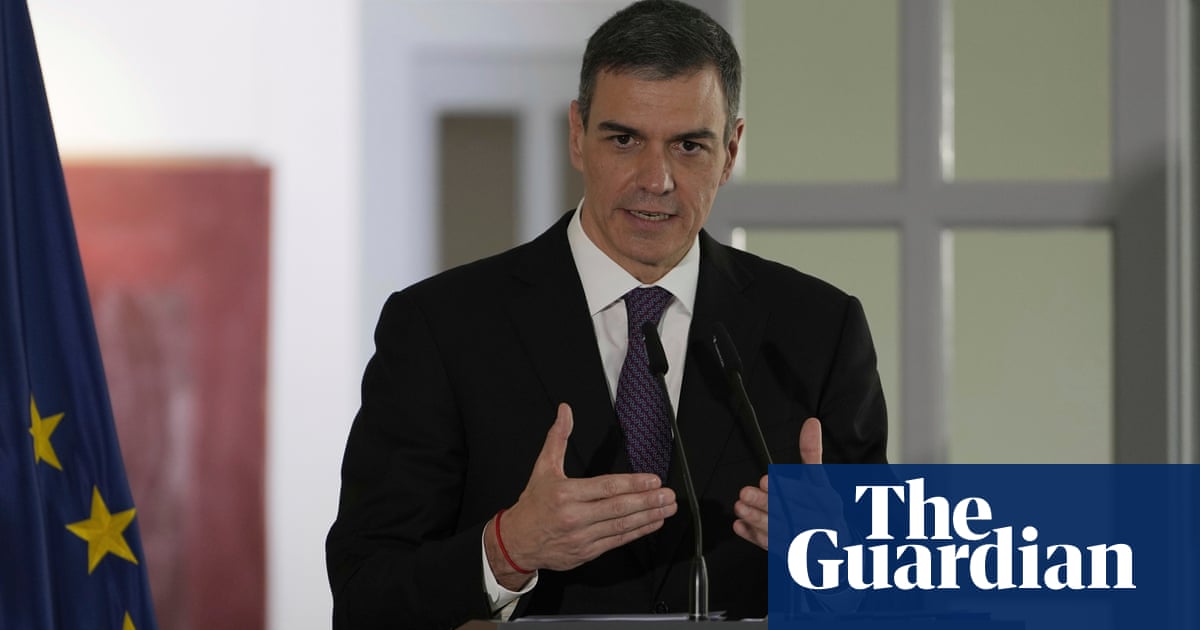Spain has announced a €10.5bn investment plan to ensure it will reach its long-delayed Nato commitment of spending 2% of its GDP on defence this year, saying it has become obvious “onlyEuropewill know how to protect Europe” from now on.
The country – which lags well behind other western nations by dedicating about 1.3% of its GDP to defence spending – is one of theNato members that has been pressured by the Trump administrationto increase its spending, and had previously committed to hitting the 2% threshold by 2029.
But speaking on Tuesday morning, Spain’s prime minister,Pedro Sánchez, unveiled a €10.5bn (£9bn) “industrial and technological plan for security and defence” that will allow Spain to meet the 2% commitment in 2025.
Sánchez said the plan, which has been approved by his cabinet and will now be submitted to the EU andNato, was needed to address the current and future defence challenges. Its main focus will be telecommunications, cybersecurity and buying military equipment.
“The enemies of Europe are not just using missiles – as we have seen in Ukraine over the past three years,” he said. “They’re also using unmanned drones and paramilitary forces to sabotage supply chains and to cut gas lines and underwater cables. They’re using social networks to issue disinformation and to polarise people and spread disaffection towards democratic institutions. They’re using AI cyber-attacks and quantum computers to compromise out telecommunications, our supply networks, and our public services in order to target our way of life.”
The prime minister – who pointed out that his administration was finally making good on the 2% commitment pledged by its conservative predecessor in 2014 – said the new plan would help reinforce European security in record time.
“In a world that’s dominated by uncertainty, Europe is hope and it is certainty – and that certainty must be protected by strengthening our security and defence systems because given what’s going on, it’s obvious that only Europe will know how to protect Europe,” he added. “AndSpainwill contribute to protecting Europe.”
Sánchez said Vladimir Putin’s “neo-imperialism” was a threat to European security, no matter how far any EU member state was from the frontlines of the conflict in Ukraine.
“The security and stability of Ukraine, of eastern Europe and the Baltic and Nordic countries, is also the security and the safety of Spain,” he said. “The people who live in those countries know that Putin is serious – and that his words are backed by deeds – and that’s why they look to Europe for protection. They’re looking for something important, and that is unity. Spain will not be indifferent to that demand. Ukraine resists, Europe responds and Spain fulfils its obligations.”
Sánchez also repeated his assurances that the additional spending would not lead to increased taxes, raids on the welfare state budget, or deficit increases. The plan has faced criticism from coalition partners in the leftwing Sumar platform, who described the plans as “incoherent” and “absolutely exorbitant”.
In January, Donald Trump increased pressure on Nato, claiming the US had shouldered the global defence burden for too long and saying he would ask all Nato members to increase defence spending to 5% of GDP.
The Nato secretary-general, Mark Rutte, has urged member states to use the threats from Washington as an incentive to take unilateral action on raising defence contributions. Last month, Rutte said the pressure was already paying off in countries such as Spain, Portugal, Belgium and Italy.
“I tell them that, well, now I am calling you to ask you to deliver the 2% by the summer, so that collectively we can move considerably north of the 2% because we have to spend much, much more than 2% but now I am calling you, but you might get a very, erm, patient man from Washington on the line if you don’t listen to me,” he said.
